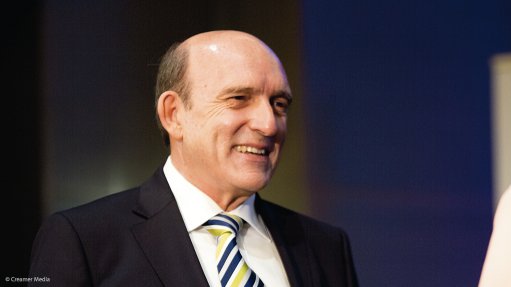
Imperial CEO Mark Lamberti
Photo by: Duane Daws
JSE-listed Imperial is preparing to table its next three-year strategy to mitigate the changing context of the environment in which it trades.
Speaking at a presentation of the group’s interim financial results, in Rosebank, on Tuesday, CEO Mark Lamberti said the volatile trading environment and Imperial's size and complexity required “strategic clarity” on the group's corporate strategy and on the business strategy at the divisional and company level.
This emerged after Imperial posted depressed earnings for the first half of the 2015 financial year, with the second half of the year, while positive, not likely to surpass the earnings reported in the comparative period last year in a tough environment.
The group’s headline earnings per share declined by 9% to 759c, while earnings per share (EPS) fell 18% to 738c and core EPS declined by 14% to 803c in the six months to December 31.
Net profit for the period to December contracted to R1.59-billion from the R1.9-billion reported in the corresponding six-month period the year before.
Imperial attributed its reported 9% decrease in operating profit to R2.87-billion to depressed margins caused by the delayed impact of a weakening rand on the competitiveness and profitability of the vehicle import, distribution and dealership division.
“The profitability of the logistics international division was depressed by low and declining activity levels in most Eurozone logistics sectors and the financial services division's results were depressed by weaker equity markets in our insurance business,” the company outlined.
However, an “excellent” performance by Logistics Africa and a “pleasing” performance by the vehicle retail, rental and aftermarket parts division partially offset the declines.
Revenue for the interim period under review was up 9% to R56.2-billion, mostly owing to acquisitions.
Imperial acquired 62.5% of pharmaceutical wholesaler Pharmed Pharmaceuticals and 70% of pharmaceuticals and medical supplies wholesaler Imres for R148-million and R647-million respectively.
The group also acquired 100% of UK-based Mercedes-Benz commercial and van and Fuso dealer S&B Commercials for R167-million.
While the reported results were “broadly in line” with market expectations, the weakening of the rand against the currencies in regions where vehicles were imported from, the poor state of the economy, political uncertainty and the impact of a sustained low oil price on Nigeria’s economy and currency emerged as the challenges Imperial was most concerned about going forward.
“A slower recovery of the German economy has caused us to reduce our full-year expectations of the logistics international division. Most significantly, the unit volume decline in the vehicle import, distribution and dealership division has necessitated a further reduction of expected profits,” Lamberti noted.
“The [economic] context that we find ourselves in is different from 10 [or] 20 years ago,” he said, describing the challenging operating environment as volatile, uncertain, complex, chaotic and ambiguous.
The group was actively implementing various strategies to enhance the value added by Imperial and the competitiveness and sustainability of its subsidiaries.
“We are confident that these initiatives will improve risk-adjusted returns and unlock shareholder value in the medium term,” Lamberti assured.
Speaking to Engineering News Online, Lamberti, who was one week shy of his first anniversary as CEO, said careful analysis of the environment and the context operated in led to a strategic proposal for the board that would outline what the company did best, where the gaps were and what the company should start doing.
The updated strategy, which would be presented to the board on March 12, outlined four critical approaches for Imperial as a parent company, including the development of the group, which would see Imperial acquire, merge and integrate assets, while driving the profitability of its group companies and disposing of noncore, strategically misaligned assets.
There was a need for a more expansive and precise strategy for the value and advantages Imperial could add to its divisions, as well as decision's on whether the parent company’s capabilities were aligned to the divisional requirements.
If the subsidiary would likely perform better as a standalone business or under another group, then it needed to be examined, he said.
Focus would also narrow to the raising, allocation and control of capital for sustainable value accretion, which, in effect, meant funding the group’s debt and equity requirements at competitive rates, allocating capital to those sectors and jurisdictions where targeted risk-adjusted returns and growth were achieved and controlling the working capital within planned limits.
Further, he noted that the company needed to clarify the subsidiaries’ various strategies and ensure each client-facing business in Imperial had a “documented plan” for how it intended competing and winning in its defined market over the medium to long term.
Lastly, the new strategy would see the development – or sharpening – of the top executives’ capabilities to lead in a low-growth economy.
Imperial’s progress and performance relied on having the “best” in terms of leadership, Lamberti commented.
Last year, Imperial spent around R200-million on employee development; however, very little had been allocated to the development of the top 100 management executives.